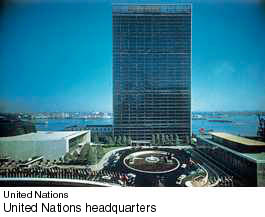
9. The formation of the United Nations (1946)
Most of the major political
and social issues that faced the world
in the second half of the 1900's stemmed from the thinking
that forged the United Nations. These issues included postcolonial globalism,
national accountability, human rights, civil rights, women's rights,
and children's rights.
The literatures of previously
subaltern states, of oppressed
populations, of classes within societies (blacks, women, immigrants,
and emigres) all developed in accord with principles articulated
and supported by the United Nations. The primary change in the
scope of literature during the century was tied to the soundings of
voices--from Africa,
Asia, Latin America, the Middle East and from women writers
and minority writers--not often heard at all in prior decades.

|

Michael Seidel
is a Professor in the
Department of English and Comparative Literature at Columbia University. His Top
10 list reflects a broad historical approach. He also discusses the impact of
the great events on writers, artists, and humanity in general.
|


